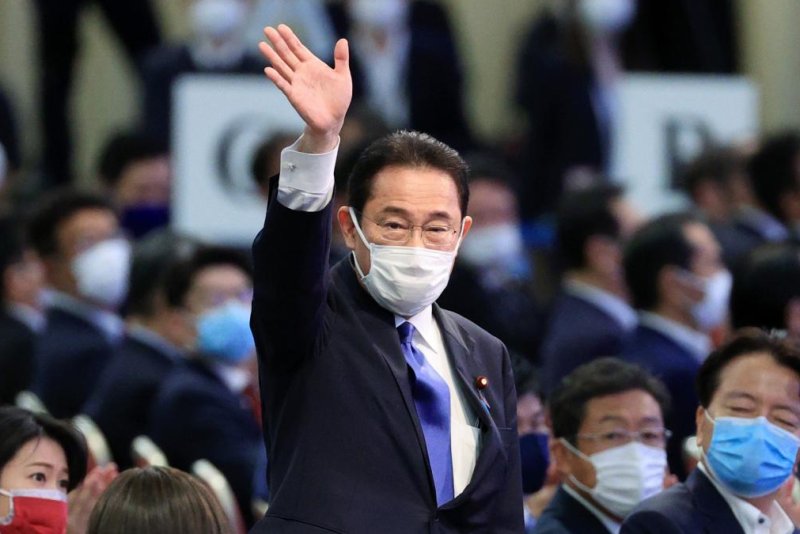Former Japanese Foreign Minister Fumio Kishida waves on Wednesday after winning the election of the ruling Liberal Democratic Party in Tokyo. Kishida will likely succeed Yoshihide Suga as prime minister. Photo by Jiji Press/EPA-EFE
SEOUL, Sept. 29 (UPI) -- Fumio Kishida, Japan's former top diplomat, won a leadership vote by lawmakers from the ruling Liberal Democratic Party on Wednesday, all but ensuring he will be the country's next prime minister.
Kishida, 64, will replace the deeply unpopular Yoshihide Suga, who announced earlier this month he would step down after serving just one year in office.
Japanese Parliament is controlled by the LDP and coalition partner Komeito and is expected to elect Kishida the country's 100th prime minister in a session on Monday.
The next leader of the world's third-largest economy faces daunting challenges at home and around the region, from bringing the COVID-19 pandemic under control and stimulating growth to dealing with security threats from North Korea and China.
"We remain under a national crisis," Kishida told LDP lawmakers after the vote. "We must strive and continue our coronavirus response and forge an economic package in the size of dozens of trillions of yen by the end of the year."
Kishida won the party leadership battle in an uncommonly close race, with none of the initial four candidates winning a majority in the first round of voting.
In a second-round runoff, Kishida topped Taro Kono, the popular 58-year-old Cabinet minister in charge of Japan's vaccination rollout, by a margin of 257 votes to 170.
Kono had been the popular favorite in public surveys, with a reform-minded message and a savvy social media presence that's rare among Japanese politicians.
In choosing the moderate Kishida, who served as former Prime Minister Shinzo Abe's foreign minister from 2012 to 2017, the LDP is emphasizing stability and continuity, according to analysts.
"Kishida is the safe choice as far as the party is concerned," said Craig Mark, a professor of international studies at Kyoritsu Women's University in Tokyo. "The rank-and-file of the LDP see him as more consensus-building compared to Kono."
On the foreign policy front, Kishida staked out a more dovish position than his hard-line LDP competitor Sanae Takaichi, who was backed by Abe.
Kishida favors strong cooperation with the United States and other countries in the regional Quad grouping against an increasingly assertive China. He's said he will continue to increase the defense budget and has advocated maintaining dialogue and a stable relationship with China, Japan's largest trading partner.
Domestically, Kishida campaigned on reducing Japan's income inequality, which was exacerbated by the COVID-19 pandemic. He's vowing a stimulus package worth hundreds of billions of dollars, in a departure from the deregulation and market-oriented policies that were a staple under Abe.
"It's going to be interesting to see if Kishida can actually go ahead with what he promised during his campaign to address income inequality," Mark added. "That's probably the biggest change, that he said he was going to depart from Abenomics."
Kishida's immediate tasks will involve naming his Cabinet, with key figures such as Deputy Prime Minister Taro Aso and Foreign Minister Toshimitsu Motegi expected to remain in place.
The soft-spoken Kishida will also have to lead the LDP through a national election, which must be held by Nov. 28.
While the LDP, which has been in power almost continuously since its creation in 1955, is expected to maintain control against a weak opposition, how it fares in the popular vote may determine how smoothly Kishida's agenda can be pushed through a still-fractious party.
"It remains to be seen how strong the victory is," Mark said. "If it's closer because [Kishida] is not as popular as Kono, then he going to be in a weaker position among the party factions."















